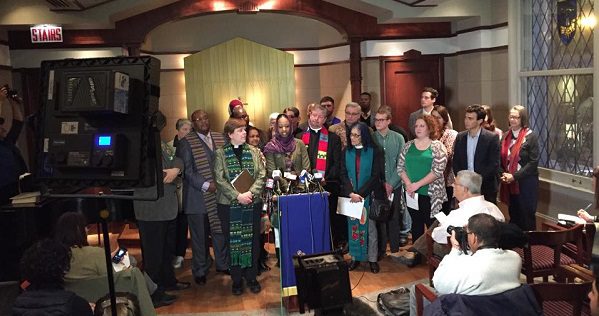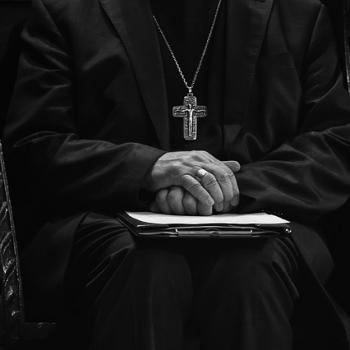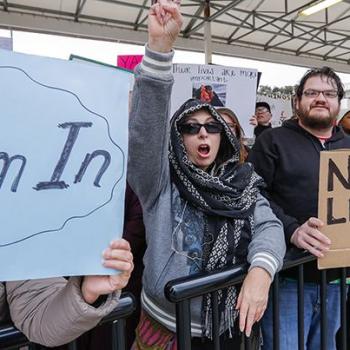
Is the question really about whether Islam and Christianity can identify with each other? Or if Allah is the same as (or similar to) the God? Or if a political science professor at a private liberal Christian evangelical college has the right to don the hijab (head scarf) for Advent in solidarity with Muslims? Or if wearing that hijab is the right demonstration of solidarity with Muslims and Muslim women?
Let’s backtrack a bit. Professor Larycia Hawkins, a political science professor at Wheaton College in Wheaton, Ill (outside of Chicago), recently began wearing the hijab after her growing concern for Muslim students at her college and worry about the increasingly toxic atmosphere of anti-Muslim backlash following San Bernardino.
“I tell my students, theoretical solidarity is not solidarity at all. Thus, beginning tonight, my solidarity has become embodied solidarity,” she wrote in an update on Facebook, adding that she believes Muslims worship the same God as Christians.
“I stand in religious solidarity with Muslims because they, like me, a Christian, are people of the book,” she wrote. “And as Pope Francis stated last week, we worship the same God.”
And then the flak became fierce, in more ways one.
Wheaton put Hawkins (a tenured professor) on administrative leave, citing that unnamed faculty has reached out to college administrators about what Hawkins was doing, but namely the issues was the relationship she drew between Christianity and Islam versus what faculty (and possibly alumni) felt were “fundamental differences” between the faiths.
We can get into whether Allah and God are the same or not (the Rev. Billy Graham weighed on it here and Sheikh Ahmed Deedat spoke about it here, to name a few), or if Islam and Christianity have things in common, as numerous scholars have done so in debates since the time I was a little girl. We can talk about whether donning the hijab really is the best way to show solidarity. (I know a lot of Muslimahs have thoughts on that.)
But the bigger question for me here is why is a professor being castigated for putting a piece of cloth on her head, making some lovely interfaith statements and going against the tide of rising Islamophobia? Are her statements of comparison between Islam and Christianity so unpalatable as to put her on suspension?
In a press release, Ahmed Rehab, executive director of CAIR-Chicago, said:
Wheaton’s decision to suspend Hawkins sends all the wrong messages to the public. “This was a genuine act of human solidarity, rooted in her sense of theological compassion, with those who are subjected to an onslaught of bigoted expression. Rather than applaud Hawkins for being a positive public representation of Christianity and its root concept of compassion, she is instead accused of undermining Christian beliefs. That to me is unfathomable.”
In addressing the College’s reprimand of Hawkins’ position that “Muslims are people of the book who worship the same God,” Rehab added:
Muslims believe in the God of Abraham, as do Christians and Jews. It is true that Muslims do not believe that Jesus is God or the son of God, but neither do Jews. Does Wheaton College then also take the position that Jews worship a different God or that the Old Testament, which is part of the Christian Bible, preaches a different God? It is hard to take a position against Hawkins’ factual statement, without getting mired in that awkward duplicity.
Over on the “Preventing Grace” Evangelical blog by Anne Kennedy, she writes that Wheaton has done the right thing by putting Hawkins on administrative leave:
Islam does not seem to be manifesting a need to have solidarity with Christians, because of us all being people of the book. If Ms. Hawkins were to toddle over to her local mosque and ask the people there what they believe about her, they would not begin to talk about how Allah is really Jesus. It is so utterly patronizing for the Christian to try to say that the Christian and the Muslim are the same in belief, especially over the nature of God.
While I have several problems with what Kennedy is saying here and with other points in her post, I think the larger issue is not delving into whether Christianity and Islam profess the same beliefs. (They are two different religions, so obviously the beliefs aren’t exactly the same. But they are quite similar in many respects.) Rather, why is she being punished for making an interfaith effort to support Muslims (on campus and in general)?
This isn’t the first time Wheaton has backed away from interfaith gestures of solidarity initiated between Muslims and Christians.
Back in 2008, Wheaton withdrew its signature from a response letter to “A Common Word Between You and Us,” a letter sent to Christian leaders in 2008 by 138 Muslim scholars and clerics calling for interfaith dialogue and “cooperation to help achieve world peace.” After reading and studying the letter, nearly 300 Christian leaders signed on, including Wheaton College. But later, then college president Duane Litfin withdrew the college’s signature:
“I signed the statement because I am committed to the business of peace-making and neighbor-love,” Litfin stated in The Record, the student publication of Wheaton College. “I did not savor the document’s unnuanced apology section, but swallowed that in order to be a part of reaching out a hand to these Muslim leaders who had courageously taken the initiative. Though the statement was not written in the way I would have written it, it seemed to me that I could sign it without compromising any of my Christian convictions.”
If what Hawkins said regarding her gesture is a compromise of Wheaton’s Christian convictions and evangelical Statement of Faith, then that’s just sad reflection on what faith should mean, what it should encompass – for Christians, for Muslims, for us all. Really sad. It seems to me that Hawkins’ gesture, misguided or not, is the very epitome of Christian convictions – love thy neighbor.











